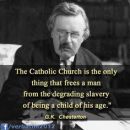
I was reminded today that … well, the fastest growing churches in our land are producing guilt-ridden workaholics rather than a community of men and women who “believe in Him and rejoice with joy that is inexpressible and filled with glory, obtaining the outcome of [their] faith, the salvation of [their] souls!” (1 Pet. 1:9). Rather than the celebration of peace with God, I fear we promote a spiritual anxiety in people who feel like, if they are following God the way they should, their lives should be fixed by now.
 I was reminded of this tension as I read this Facebook post today. It’s from an old friend, talking about his church’s upcoming weekend services. Needless to say, the names are fictitious:
I was reminded of this tension as I read this Facebook post today. It’s from an old friend, talking about his church’s upcoming weekend services. Needless to say, the names are fictitious:
Tomorrow is going to be an epic day at our Midtown Campus! John Doe, Jim Doe and Josh Doe combining on a message about Lazarus. Jessie Doe narrating. Jen Doe communicating. Jeremy Doe leading music. Our bulletins to take notes on… they are toe tags that read: Deceased: Lazarus. Physician: Jesus. Funeral Director: Martha. Case #: John 11. We’ll be looking at overcoming obstacles, trusting for miracles, and removing entanglements. I’m so excited for how God is going to use this in my life and in the lives of others.
It sounds like quite a production. There was a day when I would have been proud to be a part of such an “epic day”.
Now, there are a few things about this enterprise that make me squirm a bit, but aren’t that big a deal. All of the terminology is strikingly not-church (campus, communicating, leading music, bulletins). Jesus being termed as “physician” (only?). Playing into our culture’s CSI-enflamed media passion for crime dramas. It’s obvious that this service has been designed with seekers in mind … so the gathering seems produced to capture the fancy of non-Christians, more than to engage its own membership in the Biblically-prescribed worship of God through Christ.
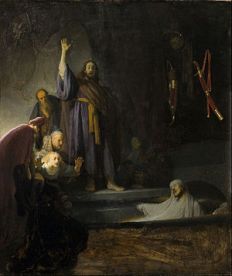 What I find most disheartening, though, is the hermeneutic of the “message”. The story of Lazarus is a narrative story that speaks of the grandness and glory of God, the power of resurrection, and the beauty-for-ashes reality of salvation! It’s about how great God is, and how we should praise Him, be assured by Him, and believe in Him. That’s why “these things were written” (John 20:31).
What I find most disheartening, though, is the hermeneutic of the “message”. The story of Lazarus is a narrative story that speaks of the grandness and glory of God, the power of resurrection, and the beauty-for-ashes reality of salvation! It’s about how great God is, and how we should praise Him, be assured by Him, and believe in Him. That’s why “these things were written” (John 20:31).
But, in true contemporary Evangelical fashion (and I say this with great warmth, since I, too, have been an Evangelical for so many decades), they’ve taken this glorious story, and turned it into a self-help seminar. Jesus is the one who can help us overcome obstacles and remove entanglements … perhaps even perform a miracle if we trust in Him correctly. The “gospel” behind this version of the story is: Incorporate Jesus into your life, and He will make it run more smoothly. Your life is what matters, and Jesus is here to help.
Again, I have to admit that I would probably have taken the same tack on this passage a few years ago. That’s before I was introduced to the classical hermeneutic of “law and gospel”. Preaching the law (telling people what they should do to be pleasing to God) is a painful-yet-necessary word for those who aren’t Christians. They need to know why they should repent of their sins, and seek to be forgiven by God. But, for the truly repentant, broken soul – the Christian – what’s needed is not the law, the but comforting assurance of the gospel: God’s love overwhelms your sin, so that you are at absolute peace with God. This gospel also serves as the greatest motivator to righteous conduct.
of the gospel: God’s love overwhelms your sin, so that you are at absolute peace with God. This gospel also serves as the greatest motivator to righteous conduct.
John 11 is, as much as any passage in the New Testament, a celebration of the completed work of Jesus – the gospel! To turn this around and use this text to instruct people how they should do their faith (appropriate the life-helps offered by Jesus … not in this passage, but perhaps elsewhere) lays burdens on the lives of believers from which Jesus came to alleviate! And, as we baptize our services in the trappings of contemporary culture, affirming to our world that you aren’t supposed to be like God, but that we and God want to be just like them … we fail to tell unbelievers that what they need most is a repentant heart, not the instructions of a life coach.
I’m so thankful for those who have recently nurtured me in classical understandings of the gospel. I wish I had known these things earlier. I am genuinely sad for the lives I’ve stressed out over the years of overemphasizing “practical application” (the “so what” and “now what”). Lord, in Your mercy, hear my prayer of repentance, and continue to lead me to an authentically redemptive proclamation of the gospel.
– EO
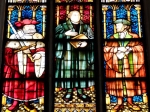
 In the U.S.A., most in our congregations are citizens (though there are also immigrants, aliens and sojourners among us). Most of these are proud of their country. In many churches, the expression of that national pride has become a part of Sunday worship celebrations, and even special programming centered around our pride in, love for, and allegiance to the U.S.A.
In the U.S.A., most in our congregations are citizens (though there are also immigrants, aliens and sojourners among us). Most of these are proud of their country. In many churches, the expression of that national pride has become a part of Sunday worship celebrations, and even special programming centered around our pride in, love for, and allegiance to the U.S.A.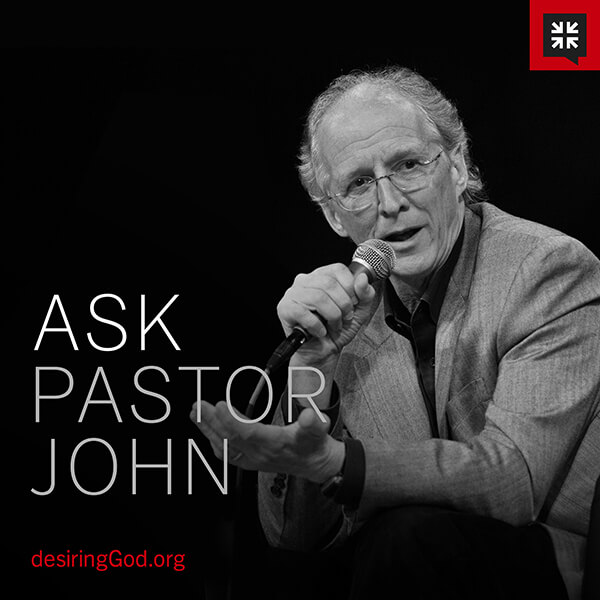 Recently, John Piper shared his thoughts about
Recently, John Piper shared his thoughts about 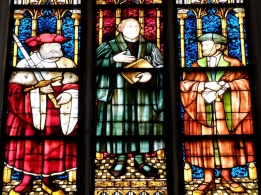 But this approach and this rhetoric fails to give weight to the Biblical truth that the Kingdoms of this world are a divinely ordained extension of the rule and reign of God. “
But this approach and this rhetoric fails to give weight to the Biblical truth that the Kingdoms of this world are a divinely ordained extension of the rule and reign of God. “ So, if I might take the liberty of reshaping Piper’s previous paragraph: “We swear absolute allegiance to him, and our allegiance to our country is an extension of our acknowledgement of His rule. All other commitments are contained in this over-arching commitment to God … All of those authorities, though subordinate, needn’t be considered “secondary” to the authority of Christ, but part of it. Therefore, all submission needn’t be qualified, except in instances when disobedience to Christ is mandated.”
So, if I might take the liberty of reshaping Piper’s previous paragraph: “We swear absolute allegiance to him, and our allegiance to our country is an extension of our acknowledgement of His rule. All other commitments are contained in this over-arching commitment to God … All of those authorities, though subordinate, needn’t be considered “secondary” to the authority of Christ, but part of it. Therefore, all submission needn’t be qualified, except in instances when disobedience to Christ is mandated.”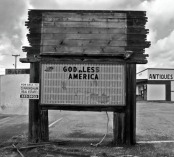 I was bemoaning U.S. politics with some old friends, one of whom has been a pastor and mentor in my life for years. He made the comment that, perhaps, the current political environment may prompt Evangelical Christians in the United States to finally disassociate themselves with party politics, and assume our Biblical posture as “aliens and strangers” in this land (1 Pet. 2:11). His idea sounded pure, freeing, liberating.
I was bemoaning U.S. politics with some old friends, one of whom has been a pastor and mentor in my life for years. He made the comment that, perhaps, the current political environment may prompt Evangelical Christians in the United States to finally disassociate themselves with party politics, and assume our Biblical posture as “aliens and strangers” in this land (1 Pet. 2:11). His idea sounded pure, freeing, liberating.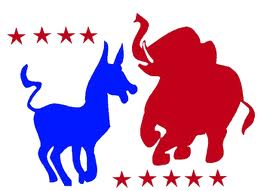 I’ve voted Republican for a long time. The primary
I’ve voted Republican for a long time. The primary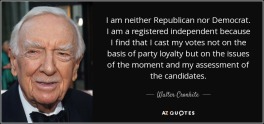 people will choose to advance economics, care for their neighbors, and, in general, live well.
people will choose to advance economics, care for their neighbors, and, in general, live well.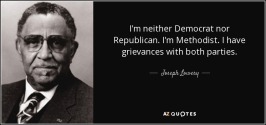 Our country is also less God-informed than ever. Faith in God, whether is has been genuine or just legalistic ethicism, had provided a moral center for our culture in decades past. But that is clearly eroding. The freedom we practice now is increasingly godless … on both sides of the aisle.
Our country is also less God-informed than ever. Faith in God, whether is has been genuine or just legalistic ethicism, had provided a moral center for our culture in decades past. But that is clearly eroding. The freedom we practice now is increasingly godless … on both sides of the aisle. Issue by issue? Sometimes I think we need government intervention. At other times, I think the best thing is for government to get out of the way. But, regarding the great issue facing our country, I’m afraid it cannot be answered by either party. It’s our godlessness. Though more than two thirds of our population believe in god, (s)he has become a side dish, no longer central to the ways we think or live.
Issue by issue? Sometimes I think we need government intervention. At other times, I think the best thing is for government to get out of the way. But, regarding the great issue facing our country, I’m afraid it cannot be answered by either party. It’s our godlessness. Though more than two thirds of our population believe in god, (s)he has become a side dish, no longer central to the ways we think or live.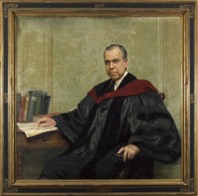
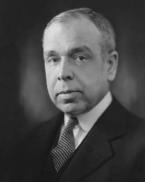


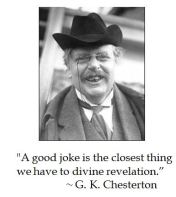

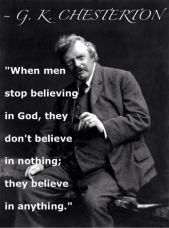 things as materialism, scientific determinism, moral relativism, and agnosticism. Since all of these have grown stronger since his day, it makes sense that G. K. and his arguments may have lost favor over the years.
things as materialism, scientific determinism, moral relativism, and agnosticism. Since all of these have grown stronger since his day, it makes sense that G. K. and his arguments may have lost favor over the years.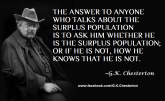 He also defended Christian ideals like fighting for a Biblical anthropology. A popular topic in London during his time was eugenics. Eugenics proposed the termination or sterilization of people with limited mental capacity. Also, leading thinkers in London had begun to think of the poor as a race of people that had failed to produce good offspring. Chesterton was vehemently opposed to these ideas, writing books, essays, and poems in defense of those who were challenged mentally and economically.
He also defended Christian ideals like fighting for a Biblical anthropology. A popular topic in London during his time was eugenics. Eugenics proposed the termination or sterilization of people with limited mental capacity. Also, leading thinkers in London had begun to think of the poor as a race of people that had failed to produce good offspring. Chesterton was vehemently opposed to these ideas, writing books, essays, and poems in defense of those who were challenged mentally and economically.